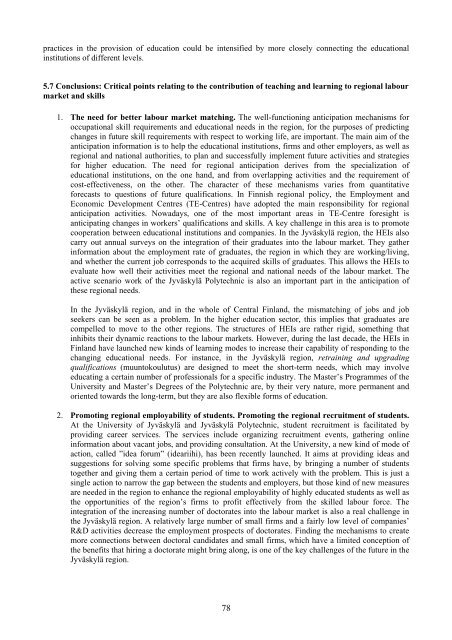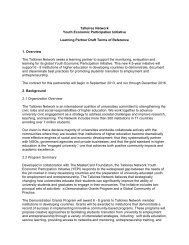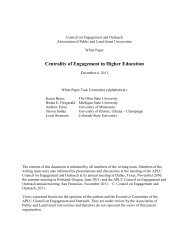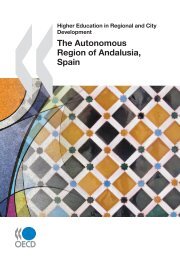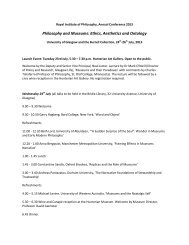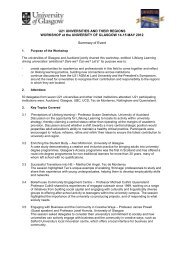Finnish Higher Education <strong>Evaluation</strong> Council (2002) study, the region’s firms expect Master’s programmesto extend the recruitment base of the labour force, and allow faster and more effective use of workers’ knowhow.The accomplished, multidisciplinary programmes correspond rather well to the university’s knowledgeprofile. The programmes have promoted the cooperation between the university and the firms in the region,improving the employability and work-readiness of students. However, the usefulness of these programmesfor the small and medium sized firms could still be increased.The EU-structural funds have contributed considerably to the supply of Master’s programmes at theUniversity of Jyväskylä, particularly in the field of information technology. In 2004, the total volume of EUstructural funding was EUR 8.1 million (approximately 5% of the total budget for the University). Thus, theend of the current EU programming period (after 2006) will be a challenge for the continuation of a largenumber of the Master’s programmes.Retraining and upgrading qualifications (muuntokoulutus) are designed in response to the needs of societyand are based on previous academic studies and aims at degree. In universities, graduate entry educationmainly leads to a Master’s degree. In 2004, the number of students participating in the Master’s Programmesand Retraining and upgrading qualifications provided by the University of Jyväskylä was 1 022, of whichnearly 60% were in the Faculties of Information Technology, and Mathematics and Science. Polytechnicsprovide Bachelor’s programmes for those with a vocational college diploma. It is worth noting that in termsof adult education degree programmes, these can be organized in different locations as the need arises, suchas the Jyväskylä Polytechnic has already done in the fields of Engineering and Technology, Business, andHealth and Social Studies. At the Jyväskylä Polytechnic, the number of students in adult education leading toBachelor’s degree was 911 in 2004. This is one way to support the life-long learning and achievement ofqualifications for workers based on the needs of firms in the Jyväskylä region and the whole of Central<strong>Finland</strong>.Strengthening the educational cooperation between HEIsThe cooperation based on complementary roles and clear division of work between the JyväskyläPolytechnic and the University of Jyväskylä is the main mechanism enhancing the regional learning system,and this has been acknowledged by the institutions. The new European degree structure adopted in <strong>Finland</strong> in2005, which is based on a two-cycle model, facilitates the clarification of the division of work between theuniversity and polytechnic. From the regional perspective, cooperation in higher education involves, inparticular, educational quality improvements, and the prioritizing and effective use of resources. In theJyväskylä Polytechnic and the University of Jyväskylä, certain educational tasks and fields are stronglyinstitution-specific and with these, cooperation is not needed at all. On the other hand, there are someeducational fields that have thematic proximity and common interfaces across the institutional borders, andthus they allow cooperation and joint coordination. The most advanced fields in this respect are informationtechnology, paper manufacturing technology, and wellness technology. Other fertile fields of regionalcooperation are energy technology (particularly renewable energy), environmental technology, andgerontology. Furthermore, in the long term, nanotechnology can provide an opportunity for collaboration.Currently, the University is developing the knowledge base of nanotechnology and at this stage the role ofthe Polytechnic is minor. However, when the technology reaches the phase of business application thePolytechnic will be able to react quickly, for example, by educating competent engineers.The Master’s programmes and the new polytechnic master’s degrees are developed to meet regional and/ornational needs and they lead to the same level of degree. As such, they also provide an excellent opportunityto deepen the cooperation between HEIs and respond to the regional learning demands. The development ofcontinuing and adult education is also a favourable field for the new openings that promote collaborationbetween HEIs in the Jyväskylä region.The collaboration should not be taking place only between the HEIs, but also with the other educationalinstitutions in the region as well. At the moment, the Jyväskylä Polytechnic is more actively cooperatingwith the other institutions, although the University staff also has contact with them. Cooperation isconcentrated on teacher education (training), continuing education, and joint educational projects. Thefurther development of education to meet the regional needs of the labour market and the exchange of good77
practices in the provision of education could be intensified by more closely connecting the educationalinstitutions of different levels.5.7 Conclusions: Critical points relating to the contribution of teaching and learning to regional labourmarket and skills1. The need for better labour market matching. The well-functioning anticipation mechanisms foroccupational skill requirements and educational needs in the region, for the purposes of predictingchanges in future skill requirements with respect to working life, are important. The main aim of theanticipation information is to help the educational institutions, firms and other employers, as well asregional and national authorities, to plan and successfully implement future activities and strategiesfor higher education. The need for regional anticipation derives from the specialization ofeducational institutions, on the one hand, and from overlapping activities and the requirement ofcost-effectiveness, on the other. The character of these mechanisms varies from quantitativeforecasts to questions of future qualifications. In Finnish regional policy, the Employment andEconomic Development Centres (TE-Centres) have adopted the main responsibility for regionalanticipation activities. Nowadays, one of the most important areas in TE-Centre foresight isanticipating changes in workers’ qualifications and skills. A key challenge in this area is to promotecooperation between educational institutions and companies. In the Jyväskylä region, the HEIs alsocarry out annual surveys on the integration of their graduates into the labour market. They gatherinformation about the employment rate of graduates, the region in which they are working/living,and whether the current job corresponds to the acquired skills of graduates. This allows the HEIs toevaluate how well their activities meet the regional and national needs of the labour market. Theactive scenario work of the Jyväskylä Polytechnic is also an important part in the anticipation ofthese regional needs.In the Jyväskylä region, and in the whole of Central <strong>Finland</strong>, the mismatching of jobs and jobseekers can be seen as a problem. In the higher education sector, this implies that graduates arecompelled to move to the other regions. The structures of HEIs are rather rigid, something thatinhibits their dynamic reactions to the labour markets. However, during the last decade, the HEIs in<strong>Finland</strong> have launched new kinds of learning modes to increase their capability of responding to thechanging educational needs. For instance, in the Jyväskylä region, retraining and upgradingqualifications (muuntokoulutus) are designed to meet the short-term needs, which may involveeducating a certain number of professionals for a specific industry. The Master’s Programmes of theUniversity and Master’s Degrees of the Polytechnic are, by their very nature, more permanent andoriented towards the long-term, but they are also flexible forms of education.2. Promoting regional employability of students. Promoting the regional recruitment of students.At the University of Jyväskylä and Jyväskylä Polytechnic, student recruitment is facilitated byproviding career services. The services include organizing recruitment events, gathering onlineinformation about vacant jobs, and providing consultation. At the University, a new kind of mode ofaction, called ”idea forum” (ideariihi), has been recently launched. It aims at providing ideas andsuggestions for solving some specific problems that firms have, by bringing a number of studentstogether and giving them a certain period of time to work actively with the problem. This is just asingle action to narrow the gap between the students and employers, but those kind of new measuresare needed in the region to enhance the regional employability of highly educated students as well asthe opportunities of the region’s firms to profit effectively from the skilled labour force. Theintegration of the increasing number of doctorates into the labour market is also a real challenge inthe Jyväskylä region. A relatively large number of small firms and a fairly low level of companies’R&D activities decrease the employment prospects of doctorates. Finding the mechanisms to createmore connections between doctoral candidates and small firms, which have a limited conception ofthe benefits that hiring a doctorate might bring along, is one of the key challenges of the future in theJyväskylä region.78
- Page 1 and 2:
OECD/IMHE ‐ Supporting thecontrib
- Page 3 and 4:
SUMMARYTogether with 13 other regio
- Page 5 and 6:
8.2 Increasing the regional effecti
- Page 7 and 8:
I INTRODUCTION1.1 Strengthening the
- Page 9 and 10:
development. The aim is that region
- Page 11 and 12:
The self-evaluation considered here
- Page 13 and 14:
densely populated cities in Finland
- Page 15 and 16:
1,9 %1,7 %1,5 %1,3 %Population chan
- Page 17 and 18:
The share of jobs in primary produc
- Page 19 and 20:
New pillars of future’s developme
- Page 21 and 22:
Jyväskylä0,60,91,11,0Central Finl
- Page 23 and 24:
2.4 Governance StructureMunicipalit
- Page 25 and 26:
of its development outside the cent
- Page 27 and 28: III CHARACTERISTICS OF THE HIGHER E
- Page 29 and 30: continuing education and open unive
- Page 31 and 32: The Science and Technology Policy C
- Page 33 and 34: 3.2 Regional dimension within the n
- Page 35 and 36: order to respond to the challenges
- Page 37 and 38: 14001200Master's degreesDoctoratesN
- Page 39 and 40: 900800Youth graduatedAdult graduate
- Page 41 and 42: provide information for the basis o
- Page 43 and 44: CabinetParliamentSTPCSteering (andf
- Page 45 and 46: 5,04,0Billion euros3,02,01,00,083 8
- Page 47 and 48: The number of refereed articles is
- Page 49 and 50: Centre of expertisePaper industryBi
- Page 51 and 52: The Institute for Environmental Res
- Page 53 and 54: and systematic gradually progressin
- Page 55 and 56: are seen to be very important chann
- Page 57 and 58: Internal support units of HEIsThe F
- Page 59 and 60: of interviewed HEI staffs, the coop
- Page 61 and 62: areas of the region’s Centre of E
- Page 63 and 64: system of Jyväskylä and the HEIs
- Page 65 and 66: V CONTRIBUTION OF TEACHING AND LEAR
- Page 67 and 68: esources to establish new activitie
- Page 69 and 70: The main problem for the Finnish la
- Page 71 and 72: longer. 2.5% of the Jyväskylä Pol
- Page 73 and 74: activities. As a part of the new qu
- Page 75 and 76: education programmes consisting of
- Page 77: the TE-Centre of Central Finland an
- Page 81 and 82: Reason forskillupgradingDescription
- Page 83 and 84: Strengths+ HEIs are actively confro
- Page 85 and 86: taxation, to lower the unemployment
- Page 87 and 88: Box 6.2 The WIRE -projects: Support
- Page 89 and 90: indoor ice-skating rink, the Rauhal
- Page 91 and 92: The School of Cultural Studies at t
- Page 93 and 94: the number of registered customers
- Page 95 and 96: Box 6.9 Environmental management in
- Page 97 and 98: Strengths+ The significance of HEIs
- Page 99 and 100: eferring to the regional developmen
- Page 101 and 102: Key topics relating to changes in t
- Page 103 and 104: participation in the decision makin
- Page 105 and 106: in the strategy-making process. The
- Page 107 and 108: 7.5 Critical points in promoting th
- Page 109 and 110: 7.Cooperation in strategies concern
- Page 111 and 112: egion is according to national and
- Page 113 and 114: oundaries for further developmental
- Page 115 and 116: joining resources and operations by
- Page 117 and 118: Discussion proposal 15: To ensure d
- Page 119 and 120: achieved by the horizontal utilizat
- Page 121 and 122: Appendix 2 Information on data used
- Page 123 and 124: and finding synergy between the oth
- Page 125 and 126: School of BusinessRoleThe School of
- Page 127 and 128: The challenge of the school from re
- Page 129 and 130:
developing wellness and environment
- Page 131 and 132:
Faculty of EducationRoleThe Faculty
- Page 133 and 134:
and/or graduation thesis is a signi
- Page 135 and 136:
Areas of strength and prioritising
- Page 137 and 138:
Agora Center’s partners from the
- Page 139 and 140:
Currently the priority of ITRI’s
- Page 141 and 142:
Weak spots and areas to develop in
- Page 143 and 144:
Employment and Economic Development
- Page 145 and 146:
Appendix 3 Analysis of the most sig
- Page 147 and 148:
Appendix 4 Regional effects (input-
- Page 149 and 150:
The overall value of production cre
- Page 151 and 152:
Appendix 5 Reform of regional struc
- Page 153 and 154:
Appendix 7 Provision of education i
- Page 155 and 156:
Appendix 8 Statistical information
- Page 157 and 158:
Appendix 10 Statistics on financing
- Page 159 and 160:
Appendix 12 Labour market activity
- Page 161 and 162:
Appendix 14 Master’s Programmes a
- Page 163 and 164:
Uusiutuvan energian tutkimusohjelma
- Page 165 and 166:
BIBLIOGRAPHYAcademy of Finland (200


